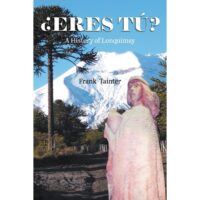Author: Frank Tainter
Publisher: Gotopublish
ISBN: 9781950073931
Pages: 328
Genre: Fiction
Reviewed by: Dan MacIntosh
Hollywood Book Reviews
There’s a whole lot going on in Frank Tainter’s novel, ¿Eres tú?: A History of Lonquimay. Yes, it is the story of an American from Montana that travels to Chile for the purpose of collecting medicinal plants. However, it is more about exploring the Chilian culture, from multiple angles. This character, Robert, is the story’s central character. But then author Frank Tainter uses him as the jumping off point to tell the reader a bunch of fascinating information about Chile. It’s a story, as well as a series of history lessons, you might say.
It is there in Chile where Robert meets Rosa, the daughter of a shaman (which is referred to as a machi). His primary interest is in medicinal plants, as he works for a company involved in the medicine business. However, Rosa’s mother, Claudia (a machi) comes from a family of shamans and knows a whole lot about medical uses for plants.
This tale is set – at times – during the turbulent Vietnam War era, where Robert is drafted and serves. It also spotlights some of the more troublesome political seasons for Chile. So, when Robert returns from Vietnam, he relocates in yet another international hotspot, Chile.
The author has a lot of specialty interests in which he uses his novel to express. One of these is Chilian folk music. Many of this book’s chapters are introduced with a lyrical snippet from a popular Chilian folk song. Rosa’s parents are popular folk singers, and their life of singing traditional (as well as political) folk songs significantly plays into this story. In fact, their activism eventually leads to their untimely demise. There are also sections in the book with extensive information about famous Chilian folk singers and songs.
Rosa, the daughter, gets romantically involved with Robert, and is impregnated by him before he goes into military service. When he returns after combat, he learns he has a daughter. Like her father, this daughter grows up to be an expert on medicinal plants, as well as exhibiting the knowledge and talents of a machi (just like her mom). She is, indeed, a chip off the old blocks.
The book includes an appendix at the end, which lists various indigenous plants and their different applications. At the book’s beginning, Tainter gives a kind of disclaimer, stating that he’s not out to prove the validity of the machi role and the plants used by these mysterious figures. Nevertheless, these scientific/religious practices play a large role in Tainter’s story, which provide a convincing argument in support of machis.
One is left with the impression Tainter sincerely loves Chile. He knows its history, culture and traditions, and this knowledge adds significant depth to his story. It may make you want to visit this amazing country, or at the very least, find a Chilian folk music playlist on Spotify and explore some of these wonderful sounds.
Although this isn’t a travel book, you will feel as if you’ve taken an exotic journey to a foreign land once you finish reading it. Yes, some of the plant information is probably too detailed for novices (which is most of us), but it’s – at the very least – fun and informative. Also, there’s a lot of political intrigue, although Tainter doesn’t let this factor get in the way of telling a good story. It’s a love story, and one that also promotes the great value of family. It’s fascinating to delve into Chile’s unique place in history. The reader empathizes with these good people, who are forced far too often to suffer because of political division. And yet, these people still remain goodhearted, which borders on the miraculous.
I hope you read this book, as it will transport you out of your everyday life, and into a whole new world; one you may not have even realized exists.

